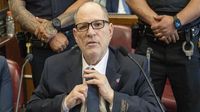Harvey Weinstein's retrial on rape and sexual assault charges commenced in New York on April 23, 2025, reviving familiar allegations while introducing a new claim from former model Kaja Sokola. The courtroom was filled with media, legal representatives, and onlookers as prosecutors laid out the case against the disgraced Hollywood mogul.
Weinstein, once a towering figure in the film industry, is facing charges related to allegations from three women: Sokola, Miriam Haley, and Jessica Mann. Sokola alleges that in 2006, Weinstein lured her to his Manhattan hotel room under the pretense of discussing movie scripts, where he then forcibly performed oral sex on her. This incident followed an earlier allegation from 2002, when Sokola, then just 16, claims Weinstein groped her in his apartment.
Assistant District Attorney Shannon Lucey, who is leading the prosecution, emphasized the power dynamics at play, stating, "He produced, choreographed, and directed their silence." Lucey argued that Weinstein exploited his influence to control and silence women, using the allure of Hollywood as a weapon against them.
In her opening statement, Lucey detailed how Sokola had maintained contact with Weinstein after the alleged assault, hoping for career opportunities despite the trauma she experienced. "Why did the defendant hold this level of power and control in the eyes of these three women? … It’s because Harvey Weinstein defined the field," Lucey told jurors.
Weinstein, now 73 and appearing in a wheelchair due to health issues, has pleaded not guilty to all charges. His defense attorney, Arthur Aidala, countered the prosecution's claims by arguing that the encounters between Weinstein and the accusers were consensual. He suggested that the women were not victims but participants in a system where favors were exchanged for fame. "The casting couch is not a crime scene," Aidala asserted, insisting that the relationships were mutually beneficial.
The retrial comes after a New York court overturned Weinstein's 2020 conviction, which had been a significant moment for the #MeToo movement. The court found that the previous trial judge had improperly allowed testimony from other women about uncharged allegations against Weinstein, which contributed to the decision to retry the case.
In addition to Sokola's allegations, the retrial focuses on claims from Haley, who alleges that Weinstein forced oral sex on her in his TriBeCa apartment in 2006, and Mann, who claims she was raped by Weinstein in a Manhattan hotel room in 2013. Prosecutors expect to call around 25 witnesses, including the three women and former Weinstein associates, to testify about the alleged incidents.
Sokola's civil lawsuit against Weinstein, which resulted in a $3.5 million settlement, was also highlighted during the trial. Sokola's attorney, Lindsay Goldbrum, expressed hope that the retrial would serve as a message to other survivors that it is worth speaking out, regardless of the challenges they may face. "This is a signal to other survivors that the system is catching up — and that it’s worth speaking out even when the odds seem insurmountable," Goldbrum stated.
As the trial progresses, the jury, composed of seven women and five men, will navigate the complexities of the testimonies and the broader implications of the #MeToo movement. The cultural context surrounding this retrial is markedly different from the first, with the #MeToo movement having evolved since its initial explosion in 2017.
While the previous trial saw protests outside the courthouse, this time there was a notable absence of such demonstrations, reflecting the changing landscape of public opinion and the legal system's handling of sexual assault cases. Prosecutors are expected to present evidence that includes emails, testimonies, and other materials relevant to the case.
Weinstein's defense team has also expanded, bringing in Jennifer Bonjean, a lawyer known for her involvement in high-profile cases, including those of Bill Cosby and R. Kelly. Aidala has indicated that the focus will be on the facts of the case, rather than the broader implications of the #MeToo movement.
As the trial unfolds, it remains to be seen how the jury will weigh the testimonies of the accusers against Weinstein's defense. The case not only holds significant implications for the lives of the women involved but also for the ongoing discourse surrounding sexual misconduct in Hollywood and beyond.
With the trial expected to last four to six weeks, the courtroom will continue to witness the unfolding drama of a case that has captivated public attention and ignited conversations about power, consent, and accountability in the entertainment industry.






